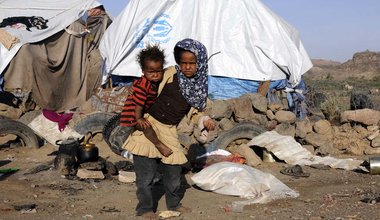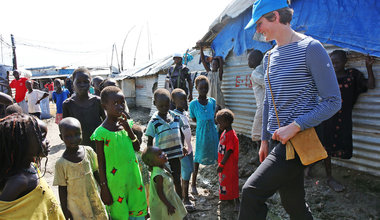Colombian leader cites his accord with rebels as paradigm for ending civil wars worldwide
 A year after pledging to return to the United Nations General Assembly to announce the end of a 52-years-long civil war that has killed more than 220,000 people and victimized over eight million more, Colombian President Juan Manuel Santos today mounted the self-same podium to declare his nation finally at peace with an accord that can serve as a precedent for the rest of the world.
A year after pledging to return to the United Nations General Assembly to announce the end of a 52-years-long civil war that has killed more than 220,000 people and victimized over eight million more, Colombian President Juan Manuel Santos today mounted the self-same podium to declare his nation finally at peace with an accord that can serve as a precedent for the rest of the world.
“The bells of peace are ringing in Colombia and their echo is heard by all nations represented in
this room,” he told the Assembly on the second day of its annual general debate, citing the final accord reached in August between his Government and the Revolutionary Armed Forces of Colombia (FARC-EP).
“Colombia gives hope to the world that it is possible to achieve the dream of peace when there is
will and commitment,” said.
“After more than half a century of internal armed conflict, I come back to the United Nations today, on the International Day of Peace, to announce, with all the strength of my voice and of my heart: the war in Colombia has ended,” he added, painting the enormous benefits that will accrue from exchanging bullets for ballots and devoting all resources to national development.
After a plebiscite on 2 October, FARC guerrillas will surrender their arms to a UN observer mission over a six-month period and become a political movement, with their weapons melted down to become three monuments to peace: one at the UN in New York, one in Cuba where the peace negotiations took place, and third in Colombia.
“These monuments will remind us that the bullets are behind us and the construction of a new and better country has begun,” Mr. Santos said. “The last and oldest armed conflict in the Western Hemisphere has come to an end. America, the vast American continent, with all of its islands, from Patagonia to Alaska, is now a zone of peace.”
The accord not only guarantees FARC participation in politics but gives greater guarantees to the opposition, to strengthening democracy and the electoral system, improving the lives of poor people, and granting access to land to those who do not have it or who lost it because of the war.
“The main characteristic of this peace process is that it focused on the protection and the guarantee of the rights of victims: the rights to truth, to justice, to reparation and to non-repetition,” Mr. Santos said, citing such mechanisms as a truth commission, while those responsible for the most serious crimes will be judged and punished.
“This is the first time in the history of the resolution of armed conflicts in the world that a Government and an illegal armed group agree on a transitional justice to submit to through an agreement and not through external imposition,” he added.
He noted that drug trafficking has fuelled war in Colombia and around the world and FARC will now cooperate in combatting the scourge, ensuring great benefits for the environment.
“The substitution of illegal crops with legal crops will end the deforestation caused by planting coca,” he said.
“A new Colombia greets the international community today, a Colombia full of hope. A Colombia that, without a war, is ready to reach its highest potential and to be a positive factor in the global context,” he concluded.
“A Colombia where the resources that used to finance war will now be geared towards education, health and security for its citizens […] I can say today, in this history-filled halt, that we have delivered, to Colombians and to the whole world. Colombia is turning the page and ending the chapter of war to start writing the chapter of peace. This is what we wish for the rest of the planet,” he declared.
President Santos is among the many leaders who will address the general debate of 71st General Assembly. The Assembly's high-level segment opened this year with the adoption Monday of the New York Declaration as the outcome of the first-ever UN Summit for Refugees and Migrants. Made up of all the 193 Member States of the United Nations, the Assembly provides a forum for multilateral discussion of international issues covered by the UN Charter.
 UN
UN







